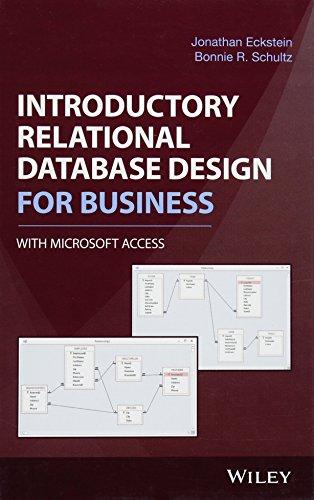Question
Please use the code below to help me answer this problem. We need to insert missing items to make the code execute Complete the program
Please use the code below to help me answer this problem. We need to insert missing items to make the code execute
Complete the program 'Scatter-Reduce.c' (Code is below) to compute the product of all elements in a given array.
#include
int *Random_Num_Generator(int Num_Elements);
int Compute_Product(int *array, int num_elements);
int main(int argc, char* argv[]) { int comm_sz, my_rank; int i, Result; int Num_Per_Proc = atoi(argv[1]);
// Seed the random number generator to get different results each time srand(time(NULL)); MPI_Init(&argc, &argv);
MPI_Comm_rank(MPI_COMM_WORLD, &my_rank); MPI_Comm_size(MPI_COMM_WORLD, &comm_sz);
// Generate a random array of elements on process 0 int *Random_Nums = NULL;
if (my_rank == 0) { Random_Nums = Random_Num_Generator(Num_Per_Proc * comm_sz);
printf("The random numbers generated: ");
for (i = 0; i < Num_Per_Proc * comm_sz; i++)
printf("%d; ", Random_Nums[i]);
printf(" "); }
// Generate a buffer for holding a subset of the entire array int *Sub_Random_Nums = (int *)malloc(sizeof(int) * Num_Per_Proc); // Scatter the random integer numbers from process 0 to all processes MPI_Scatter(Random_Nums, Num_Per_Proc, MPI_INT, Sub_Random_Nums, Num_Per_Proc, MPI_INT, 0, MPI_COMM_WORLD); // Compute the product value of a subset array on each process int Sub_Product = Compute_Product(Sub_Random_Nums, Num_Per_Proc);
// Reduce the total product value of all elements to process 0 MPI_Reduce(&Sub_Product, , 1, MPI_INT, , 0, MPI_COMM_WORLD);
if (my_rank == 0) printf("Total product of all elements is %d ", Result);
// Clean up if (my_rank == 0) free(Random_Nums); free(Sub_Random_Nums); MPI_Finalize(); return 0;
}
// Create an array of random integer numbers ranging from 1 to 10 int *Random_Num_Generator(int Num_Elements) { int *Rand_Nums = (int *)malloc(sizeof(int) * Num_Elements); int i;
for (i = 0; i < Num_Elements; i++) Rand_Nums[i] = (rand() % 10) + 1;
return Rand_Nums; }
// Computes the product of an array of numbers int Compute_Product(int *array, int num_elements) { int product = 1; int i; for (i = 0; i < num_elements; i++) product *= array[i]; return product; }
Please note, below is an example we had
#include
int *Random_Num_Generator(int Num_Elements);
int Compute_Product(int *array, int num_elements);
int main(int argc, char* argv[]) { int comm_sz, my_rank; int i; int Num_Per_Proc = atoi(argv[1]);
// Seed the random number generator to get different results each time srand(time(NULL)); MPI_Init(&argc, &argv);
MPI_Comm_rank(MPI_COMM_WORLD, &my_rank); MPI_Comm_size(MPI_COMM_WORLD, &comm_sz);
// Generate a random array of elements on process 0 int *Random_Nums = NULL;
if (my_rank == 0) { Random_Nums = Random_Num_Generator(Num_Per_Proc * comm_sz);
printf("The random numbers generated: ");
for (i = 0; i < Num_Per_Proc * comm_sz; i++) printf("%d ", Random_Nums[i]);
printf(" "); }
// Generate a buffer for holding a subset of the entire array int *Sub_Random_Nums = (int *)malloc(sizeof(int) * Num_Per_Proc); // Scatter the random integer numbers from process 0 to all processes MPI_Scatter(Random_Nums, Num_Per_Proc, MPI_INT, Sub_Random_Nums, Num_Per_Proc, MPI_INT, 0, MPI_COMM_WORLD); // Compute the product value of a subset array on each process int Sub_Product = Compute_Product(Sub_Random_Nums, Num_Per_Proc);
// Gather all partial product values to process 0 int *Partial_Results = NULL;
if (my_rank == 0)
Partial_Results = (int *)malloc(sizeof(int) * comm_sz); MPI_Gather(&Sub_Product, 1, MPI_INT, Partial_Results, 1, MPI_INT, 0, MPI_COMM_WORLD); // Compute the total product value of all numbers on process 0 if (my_rank == 0) { int Result = Compute_Product(Partial_Results, comm_sz);
printf("Total product of all elements is %d ", Result); } // Clean up if (my_rank == 0) { free(Random_Nums); free(Partial_Results); }
free(Sub_Random_Nums); MPI_Finalize();
return 0; }
// Create an array of random integer numbers ranging from 1 to 10 int *Random_Num_Generator(int Num_Elements) { int *Rand_Nums = (int *)malloc(sizeof(int) * Num_Elements); int i;
for (i = 0; i < Num_Elements; i++) Rand_Nums[i] = (rand() % 10) + 1;
return Rand_Nums; }
// Computes the product of an array of numbers int Compute_Product(int *array, int num_elements) { int product = 1; int i; for (i = 0; i < num_elements; i++) product *= array[i]; return product; }
Step by Step Solution
There are 3 Steps involved in it
Step: 1

Get Instant Access to Expert-Tailored Solutions
See step-by-step solutions with expert insights and AI powered tools for academic success
Step: 2

Step: 3

Ace Your Homework with AI
Get the answers you need in no time with our AI-driven, step-by-step assistance
Get Started


